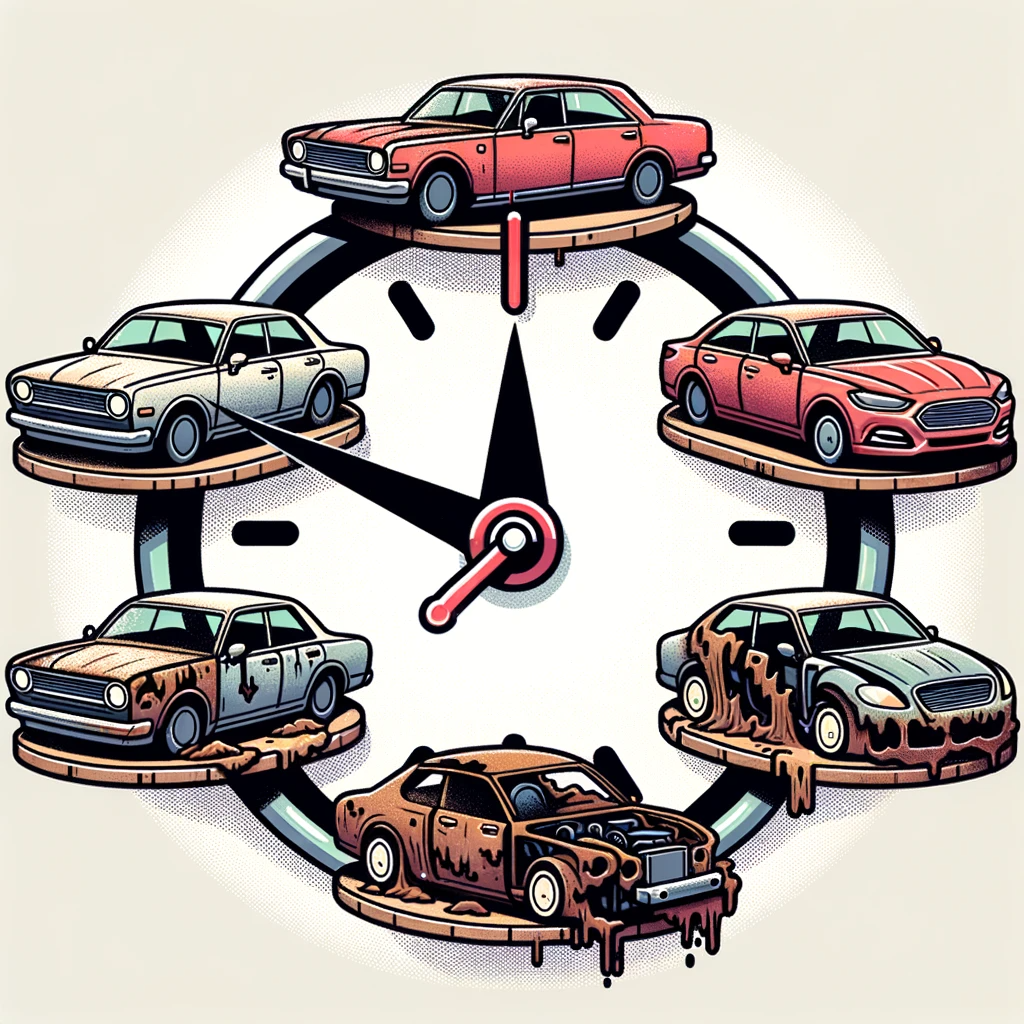I. Introduction
A. Brief introduction to the topic
B. Importance of recognizing the right time to scrap a car
C. Mention of factors influencing the decision
II. Financial Considerations
A. Depreciation
- Definition and explanation
- How it affects the value of a car over time
B. Cost of Repairs
- Comparison of repair costs versus the car’s value
- When repair costs outweigh the car’s worth
C. Fuel Efficiency
- Decline of fuel efficiency over time
- Comparing fuel costs in older versus newer models
III. Safety Concerns
A. Overview of common safety issues in older cars
B. Availability of modern safety features in newer models
C. Accidents and incident rates related to vehicle age
IV. Environmental Impact
A. Emission standards and pollution
B. Benefits of scrapping older, less efficient vehicles
C. Introduction to eco-friendly disposal methods
V. Legal and Regulatory Considerations
A. Review of laws and regulations regarding vehicle condition
B. Emission test failures and legal repercussions
C. Benefits of adhering to legal standards
VI. Emotional Attachment and Lifestyle Changes
A. Discussion on emotional attachment to vehicles
B. How lifestyle changes can influence the decision to scrap
VII. The Scrapping Process
A. Steps involved in scrapping a car
B. How to choose a reputable scrapping service
C. What to expect from the process
VIII. Conclusion
A. Recap of key points
B. Encouragement to weigh all factors when considering scrapping a car
Introduction
Owning a car is a significant convenience that brings an immense sense of freedom. However, every vehicle reaches a point where its utility diminishes, and the cost of keeping it roadworthy overshadows the benefits. Recognizing the right time to scrap your car can save money, ensure personal safety, and even contribute positively to the environment. This article delves into the various factors that influence the decision to scrap a car and provides a thorough understanding of when it might be time to say goodbye to your old four-wheeled companion.
Financial Considerations
Depreciation
Every car undergoes depreciation, which is the reduction in its value over time. The rate at which a car depreciates depends on its make, model, and condition. Generally, cars lose value rapidly during the initial years and then stabilize at a slower depreciation rate. Understanding the depreciation curve of your vehicle can help ascertain whether keeping it is a financially sound decision.
Cost of Repairs
As cars age, they require more maintenance and repairs to remain functional and safe. At some point, the cost of repairs can begin to exceed the value of the car itself. When the repair bills start piling up and show no sign of abating, it might be time to consider scrapping your car.
Fuel Efficiency
Older cars tend to be less fuel-efficient compared to newer models due to advancements in engine technology. If you find yourself frequently at the fuel station and your wallet getting lighter with each visit, it may be a sign to consider an upgrade to a more fuel-efficient vehicle.
Safety Concerns
Common Safety Issues
Older cars often lack modern safety features that have become standard in newer models. Besides, wear and tear could lead to crucial safety components like brakes or airbags becoming less reliable over time.
Modern Safety Features
Newer car models come equipped with advanced safety features like automatic emergency braking, blind-spot monitoring, and lane departure warnings, which significantly reduce the risk of accidents. If your old car lacks these features, it might be a prudent decision to scrap it in favor of a safer, modern vehicle.
Environmental Impact
Emission Standards
Older cars often fall short of current emission standards, contributing more pollution to the environment. Scrapping such vehicles and replacing them with newer, more efficient models or electric cars can be a significant step towards reducing your carbon footprint.
Eco-Friendly Disposal
When the time comes to scrap your car, opting for eco-friendly disposal methods ensures that harmful materials are properly handled, and recyclable materials are salvaged, minimizing the environmental impact.
Legal and Regulatory Considerations
Laws and Regulations
There are various laws and regulations concerning the roadworthiness and emissions of vehicles. Failing an emissions test or being unable to meet safety standards can lead to fines or even the impounding of your vehicle.
Legal Benefits
Adhering to legal standards not only avoids penalties but also ensures a safer driving environment for everyone on the road.
Emotional Attachment and Lifestyle Changes
Emotional Attachment
Many people form a sentimental attachment to their cars. While it’s natural, it’s crucial to weigh the emotional attachment against practical considerations like safety, financial implications, and legal compliance.
Lifestyle Changes
Your lifestyle changes over time, and what was once a perfect car for you may no longer meet your needs. Whether it’s a growing family, a new job, or a move to a city, different life stages call for different types of vehicles.
The Scrapping Process
Choosing a Reputable Scrapping Service
When you decide to scrap your car, choosing a reputable and responsible scrapping service is crucial. They should follow eco-friendly disposal practices and offer you a fair price for your vehicle.
The Process
The process typically involves having your car evaluated, receiving a quote, and then having your car towed away to the scrap yard. The scrapping service will handle all the necessary paperwork, making the process hassle-free.
Conclusion
Deciding when to scrap your car involves a thorough evaluation of various factors including financial, safety, environmental, legal, and personal considerations. By weighing all these factors, you can make an informed decision that benefits not just you, but the community and the environment at large.
